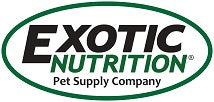Hedgehogs are insectivores by nature—curious, active, and opportunistic feeders. In the wild, their diet consists primarily of insects, supplemented by small amounts of fruits, vegetables, and proteins they find along the way. As pets, hedgehogs thrive on a carefully balanced, high-protein, low-fat diet that mimics their natural intake while supporting their overall health.
Whether you're a first-time hedgehog owner or looking to fine-tune your pet’s nutrition plan, this guide will walk you through exactly what your hedgehog needs to live a happy, healthy life, along with product recommendations from Exotic Nutrition, your trusted source for exotic pet care.
Core Diet: Insect-Based Nutrition
To ensure your hedgehog receives complete daily nutrition, we recommend offering Hedgehog Complete as the primary diet. This premium food is formulated specifically for hedgehogs, blending high-quality ingredients with dried mealworms, which are an excellent source of chitin—a fiber-like substance found in insect exoskeletons that aids digestion and supports gut health.
Offer this food free choice, meaning it should always be available in your hedgehog’s enclosure. Use a No-Tip Ceramic Feed Station to prevent spills and keep the food clean and accessible.
To add variety, consider rotating in:
-
ZooPro Hedgehog Essential – A high-protein, low-fat food with premium animal-based proteins
-
Berries & Bugs – A unique blend of gut-loaded insects, grains, and antioxidant-rich berries
-
Premium Insectivore Diet – Chicken-based protein with added omega-3 fatty acids for skin and coat health
Treats & Variety (In Moderation)
Hedgehogs can enjoy limited treats, but moderation is key. Choose low-sugar, protein-rich options like:
-
Live Mealworms – A favorite treat that stimulates natural hunting behavior
-
Dried Insects – Such as crickets, waxworms, or mealworms for easy storage and feeding
-
Hedgehog Treat Variety Pack – A convenient sampler of healthy snacks
Fresh fruits and vegetables can also be offered in small portions—sweet potato, leafy greens, or berries are safe choices. You can even use plain baby food (vegetable-based, without added sugar or onion) as a treat. Avoid anything high in sugar or fat, and never feed chocolate, grapes, raisins, onions, avocado, raw meat, or raw egg yolks.
Foods to Avoid
Because of their unique mouth shape and digestion, hedgehogs should not be fed nuts (which can cause choking), and nut butters are generally too high in fat to be appropriate. Lactose intolerance is also common, so dairy should be avoided, with the occasional exception of plain low-fat yogurt or cottage cheese in tiny amounts.
Supplements
While a well-rounded diet should meet most nutritional needs, hedgehogs who are ill, pregnant, recovering, or calcium-deficient may benefit from supplementation:
-
Hedgehog Booster – A daily multivitamin powder to mix with food
-
VitaGlow Supplement – Provides omega-3 fatty acids to promote healthy skin, fur, and joints
Always consult with a veterinarian before starting supplements during times of illness or recovery.
Feeding Tools & Environment
Fresh water should always be available via a Glass Water Bottle—durable, chew-proof, and easy to clean. Plastic bottles may degrade or leak, especially with active pets.
For feeding and general care:
-
Maintain a clean enclosure with CareFresh Complete Bedding—soft, absorbent, and safe for small animals
-
Keep your pet warm with a Heating Set, especially in colder months
Exercise & Obesity Prevention
Hedgehogs can easily become overweight, especially when fed too many fatty treats or not given enough space to move. A simple rule of thumb: if your hedgehog can’t roll into a tight ball, they may be overweight.
Help manage their weight by reducing high-fat foods and encouraging daily exercise with safe accessories:
-
Silent Runner 12” Exercise Wheel – Whisper-quiet and designed to protect tiny feet from injury
-
Treadmill Wheel – Another safe and effective option to keep your hedgehog moving
Pair exercise wheels with enriching spaces that include a Wood Hideout or tunnels for natural exploration.
Final Thoughts
Feeding your hedgehog isn’t just about nutrition—it’s about mimicking their wild habits while preventing common health issues like obesity, digestive upset, and nutrient deficiencies. By offering a protein-rich, low-fat, insect-based diet, safe treats, and a stimulating environment, you're setting your hedgehog up for a long, healthy life.

Leave a Comment